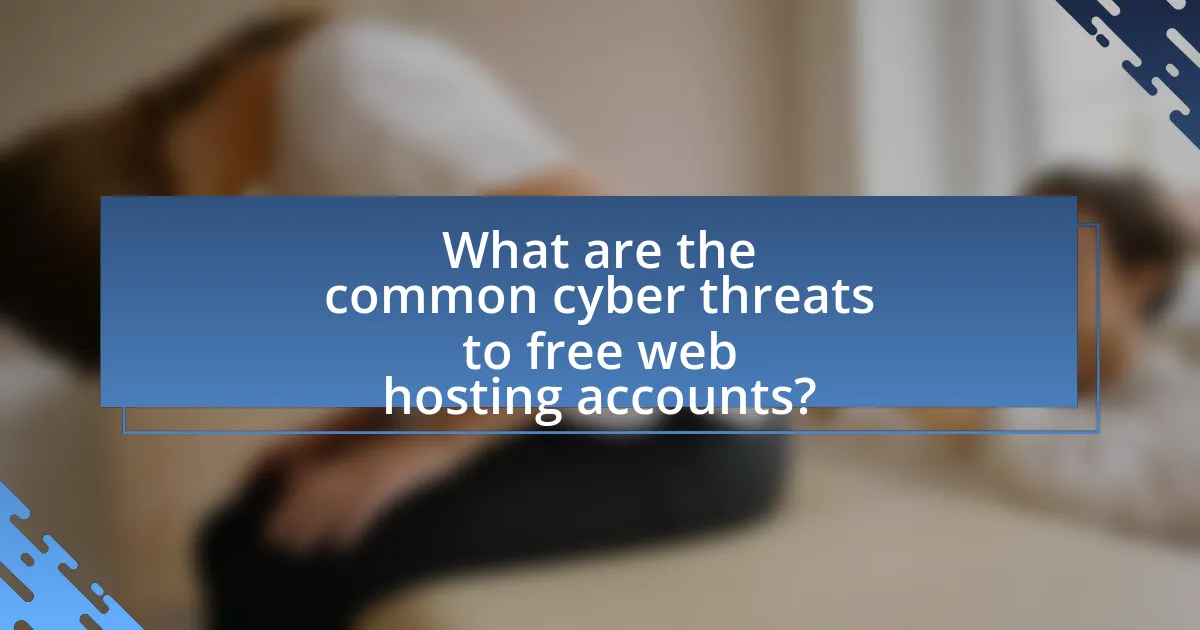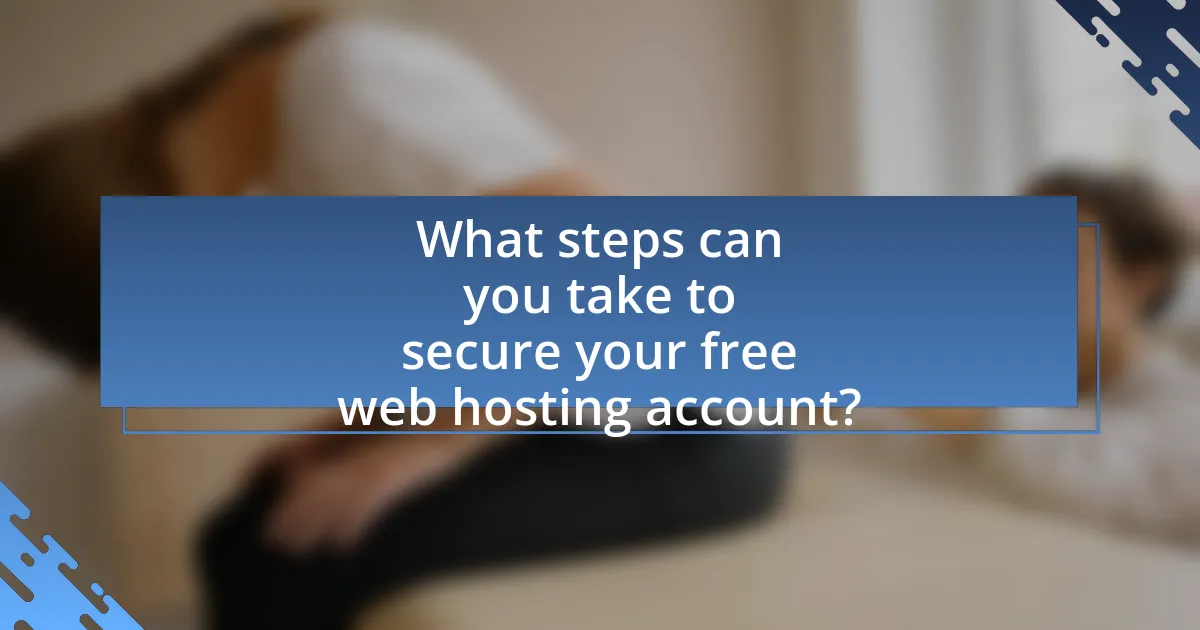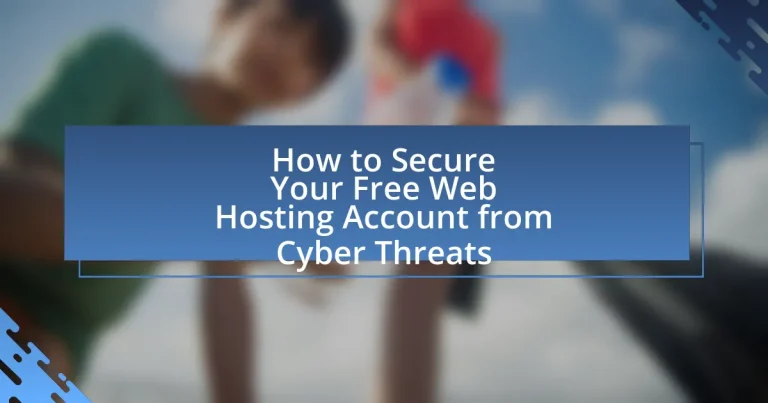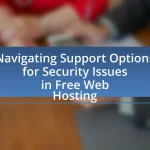The article focuses on securing free web hosting accounts from various cyber threats, including malware infections, phishing attacks, and data breaches. It outlines how hackers exploit vulnerabilities in free hosting services due to weak security measures and limited resources. Key methods of exploitation, such as phishing and malware distribution, are discussed, along with the importance of implementing strong passwords and two-factor authentication. The article emphasizes best practices for ongoing security, including regular software updates and the use of security tools like firewalls and malware scanners, to protect sensitive information and maintain account integrity.

What are the common cyber threats to free web hosting accounts?
Common cyber threats to free web hosting accounts include malware infections, phishing attacks, and data breaches. Malware can be injected into websites hosted on free platforms, compromising user data and site functionality. Phishing attacks often target users of free hosting services, tricking them into revealing sensitive information. Data breaches can occur due to inadequate security measures, exposing personal and financial information. According to a 2021 report by Cybersecurity Ventures, 60% of small businesses that experience a cyber attack go out of business within six months, highlighting the critical need for robust security even in free hosting environments.
How do hackers typically target free web hosting accounts?
Hackers typically target free web hosting accounts by exploiting their inherent vulnerabilities, such as weak security measures and lack of monitoring. These accounts often have limited resources, making them attractive for attackers seeking to deploy malicious content or phishing schemes. For instance, many free hosting services do not implement robust security protocols, allowing hackers to easily access sensitive data or inject malware. Additionally, the anonymity provided by free hosting can facilitate cybercriminal activities without significant risk of detection.
What methods do cybercriminals use to exploit vulnerabilities?
Cybercriminals exploit vulnerabilities through various methods, including phishing, malware distribution, and exploiting software flaws. Phishing involves tricking individuals into providing sensitive information by masquerading as legitimate entities, often through deceptive emails or websites. Malware distribution occurs when cybercriminals use malicious software to gain unauthorized access to systems, often exploiting unpatched software vulnerabilities. Additionally, they may leverage known software flaws, such as those listed in the Common Vulnerabilities and Exposures (CVE) database, to infiltrate systems and networks. These methods are effective due to the prevalence of unpatched systems and the human factor in security breaches.
How can phishing attacks affect free web hosting users?
Phishing attacks can significantly compromise free web hosting users by tricking them into revealing sensitive information, such as login credentials. These attacks often involve fraudulent emails or websites that mimic legitimate services, leading users to unknowingly provide their data to cybercriminals. According to the Anti-Phishing Working Group, there were over 200,000 unique phishing attacks reported in 2020, highlighting the prevalence of this threat. As a result, free web hosting users may face unauthorized access to their accounts, data breaches, and potential loss of their hosted content, making it crucial for them to implement security measures to protect against such attacks.
Why are free web hosting accounts more vulnerable to cyber threats?
Free web hosting accounts are more vulnerable to cyber threats due to limited security measures and resources provided by the hosting service. These accounts often lack essential features such as robust firewalls, regular security updates, and dedicated customer support, which are typically available in paid hosting plans. Additionally, free hosting services may host multiple websites on the same server, increasing the risk of cross-site vulnerabilities. According to a study by the Cybersecurity & Infrastructure Security Agency, free hosting platforms are frequently targeted by attackers because they often have weaker security protocols, making them easier to exploit.
What limitations do free web hosting services impose on security?
Free web hosting services impose significant limitations on security, primarily due to a lack of robust security measures and resources. These services often do not provide essential features such as SSL certificates, which encrypt data transmitted between the user and the server, leaving sensitive information vulnerable to interception. Additionally, free hosting platforms typically have limited server monitoring and maintenance, increasing the risk of malware infections and data breaches. According to a study by the Cybersecurity & Infrastructure Security Agency, free hosting services are frequently targeted by cybercriminals due to their inadequate security protocols, making them a higher risk for users.
How does the lack of resources in free hosting affect security measures?
The lack of resources in free hosting significantly compromises security measures. Free hosting services often provide limited bandwidth, storage, and processing power, which restricts the implementation of robust security protocols. For instance, without adequate resources, hosting providers may not be able to deploy advanced firewalls, intrusion detection systems, or regular security updates, leaving websites vulnerable to attacks. Additionally, the shared nature of free hosting environments increases the risk of cross-site scripting and data breaches, as multiple users share the same server resources. This lack of isolation can lead to a higher likelihood of exploitation by malicious actors.

What steps can you take to secure your free web hosting account?
To secure your free web hosting account, implement strong passwords and enable two-factor authentication. Strong passwords should be at least 12 characters long, combining letters, numbers, and symbols, which significantly reduces the risk of unauthorized access. Two-factor authentication adds an extra layer of security by requiring a second form of verification, such as a code sent to your mobile device, making it harder for attackers to gain access even if they have your password. According to a study by Google, two-factor authentication can block 99.9% of automated attacks, highlighting its effectiveness in enhancing account security.
How can strong passwords enhance the security of your account?
Strong passwords enhance the security of your account by making it significantly more difficult for unauthorized users to gain access. A strong password typically includes a combination of uppercase and lowercase letters, numbers, and special characters, which increases the number of possible combinations and thus the time required for brute-force attacks. Research indicates that 81% of data breaches are linked to weak or stolen passwords, highlighting the critical role that strong passwords play in protecting sensitive information. By using strong passwords, users can reduce the likelihood of account compromise and safeguard their personal and financial data from cyber threats.
What are the characteristics of a strong password?
A strong password is characterized by its length, complexity, and unpredictability. Specifically, it should be at least 12 to 16 characters long, incorporating a mix of uppercase letters, lowercase letters, numbers, and special symbols. This combination makes it significantly harder for attackers to guess or crack the password using brute force methods. Research indicates that passwords with these characteristics can take years or even centuries to crack, depending on the attack method used. For example, a password that is 16 characters long with a mix of character types can provide a security level that is exponentially more secure than a simple, common password.
How often should you change your password for optimal security?
You should change your password every three to six months for optimal security. Regularly updating passwords reduces the risk of unauthorized access, especially if a password has been compromised without your knowledge. The National Institute of Standards and Technology (NIST) recommends this frequency to enhance security measures, as frequent changes can help mitigate the impact of potential data breaches.
What role does two-factor authentication play in securing your account?
Two-factor authentication (2FA) significantly enhances account security by requiring two forms of verification before granting access. This additional layer of security mitigates the risk of unauthorized access, as even if a password is compromised, the account remains protected unless the second factor, typically a code sent to a mobile device or generated by an authentication app, is also obtained. According to a study by Google, 2FA can block 100% of automated bots and 96% of phishing attacks, demonstrating its effectiveness in safeguarding accounts against common cyber threats.
How can you enable two-factor authentication on your hosting account?
To enable two-factor authentication on your hosting account, access your account settings and locate the security options. Most hosting providers offer a dedicated section for two-factor authentication, where you can select your preferred method, such as SMS or an authentication app. After selecting the method, follow the prompts to link your phone number or app, and complete the verification process. This process enhances security by requiring a second form of identification in addition to your password, significantly reducing the risk of unauthorized access.
What are the benefits of using two-factor authentication?
Two-factor authentication (2FA) significantly enhances security by requiring two forms of verification before granting access to an account. This additional layer of protection reduces the risk of unauthorized access, as even if a password is compromised, the second factor—such as a text message code or authentication app—remains secure. According to a study by Google, implementing 2FA can block 99.9% of automated attacks, demonstrating its effectiveness in safeguarding sensitive information against cyber threats.

What best practices should you follow for ongoing security?
To ensure ongoing security for your free web hosting account, implement strong password policies, regularly update software, and utilize two-factor authentication. Strong passwords should be complex, combining letters, numbers, and symbols, and changed frequently to reduce the risk of unauthorized access. Regular software updates patch vulnerabilities, as evidenced by a report from the Cybersecurity & Infrastructure Security Agency (CISA) indicating that 60% of breaches exploit known vulnerabilities. Two-factor authentication adds an additional layer of security, significantly decreasing the likelihood of account compromise.
How can regular updates improve your web hosting security?
Regular updates enhance web hosting security by patching vulnerabilities and fixing bugs that could be exploited by cybercriminals. When software, including operating systems and applications, is regularly updated, it incorporates the latest security measures and protocols, reducing the risk of unauthorized access. For instance, a report from the Cybersecurity & Infrastructure Security Agency (CISA) indicates that 85% of successful cyberattacks exploit known vulnerabilities for which patches are available. Therefore, maintaining up-to-date software is crucial for safeguarding web hosting environments against potential threats.
What specific updates should you prioritize for your hosting account?
Prioritize updates for your hosting account that enhance security, including applying the latest security patches, updating software and plugins, and changing passwords regularly. Security patches are crucial as they fix vulnerabilities that could be exploited by cyber threats; for instance, a study by the Ponemon Institute found that 60% of data breaches are linked to unpatched vulnerabilities. Regularly updating software and plugins ensures that you are protected against known exploits, while changing passwords frequently reduces the risk of unauthorized access.
How can outdated software lead to security vulnerabilities?
Outdated software can lead to security vulnerabilities because it often lacks the latest security patches and updates that protect against known threats. When software is not regularly updated, it becomes an easy target for cyber attackers who exploit these unpatched vulnerabilities. For instance, a report by the Cybersecurity and Infrastructure Security Agency (CISA) indicated that 60% of breaches involved vulnerabilities for which a patch was available but not applied. This highlights the critical importance of maintaining up-to-date software to safeguard against potential exploits.
What security tools can help protect your free web hosting account?
To protect your free web hosting account, utilize security tools such as SSL certificates, firewalls, and malware scanners. SSL certificates encrypt data transmitted between users and your website, ensuring secure connections. Firewalls monitor and control incoming and outgoing network traffic based on predetermined security rules, effectively blocking unauthorized access. Malware scanners regularly check for malicious software that could compromise your site, allowing for timely removal and protection against threats. These tools collectively enhance the security posture of your web hosting account, reducing vulnerability to cyber threats.
Which antivirus and anti-malware tools are recommended for web hosting?
Recommended antivirus and anti-malware tools for web hosting include Bitdefender, Kaspersky, and Malwarebytes. Bitdefender offers robust protection with advanced threat detection capabilities, making it suitable for web hosting environments. Kaspersky is known for its strong malware protection and real-time scanning features, which help safeguard web servers. Malwarebytes specializes in detecting and removing malware, providing an additional layer of security for web hosting accounts. These tools are widely recognized in the industry for their effectiveness in protecting against cyber threats, ensuring the integrity and security of web hosting services.
How can firewalls enhance the security of your hosting environment?
Firewalls enhance the security of your hosting environment by monitoring and controlling incoming and outgoing network traffic based on predetermined security rules. They act as a barrier between trusted internal networks and untrusted external networks, effectively blocking unauthorized access and potential threats. For instance, according to a study by the Cybersecurity & Infrastructure Security Agency, organizations that implement firewalls can reduce the risk of data breaches by up to 60%. This statistic underscores the effectiveness of firewalls in protecting sensitive information and maintaining the integrity of hosting environments.
What are some common troubleshooting tips for security issues?
Common troubleshooting tips for security issues include regularly updating software, using strong and unique passwords, enabling two-factor authentication, and monitoring account activity for unauthorized access. Regular software updates patch vulnerabilities, reducing the risk of exploitation. Strong passwords, ideally a mix of letters, numbers, and symbols, enhance security by making it difficult for attackers to gain access. Two-factor authentication adds an extra layer of protection, requiring a second form of verification. Monitoring account activity helps identify suspicious behavior early, allowing for prompt action to mitigate potential threats.
How can you identify if your account has been compromised?
You can identify if your account has been compromised by monitoring for unauthorized access, unusual activity, or changes to your account settings. Signs include receiving unexpected password reset emails, noticing unfamiliar login locations or devices, and finding changes to your account information that you did not make. According to a 2021 report by the Cybersecurity & Infrastructure Security Agency, 60% of individuals reported experiencing unauthorized access to their accounts, highlighting the prevalence of this issue.
What steps should you take immediately if you suspect a breach?
If you suspect a breach, immediately isolate the affected system to prevent further unauthorized access. This involves disconnecting the device from the network and disabling any remote access features. Next, assess the extent of the breach by reviewing logs and identifying compromised accounts or data. Document all findings meticulously, as this information is crucial for further investigation and potential legal action. Finally, notify your hosting provider and relevant authorities to report the incident and seek assistance in mitigating the breach. These steps are essential to contain the threat and protect sensitive information.


